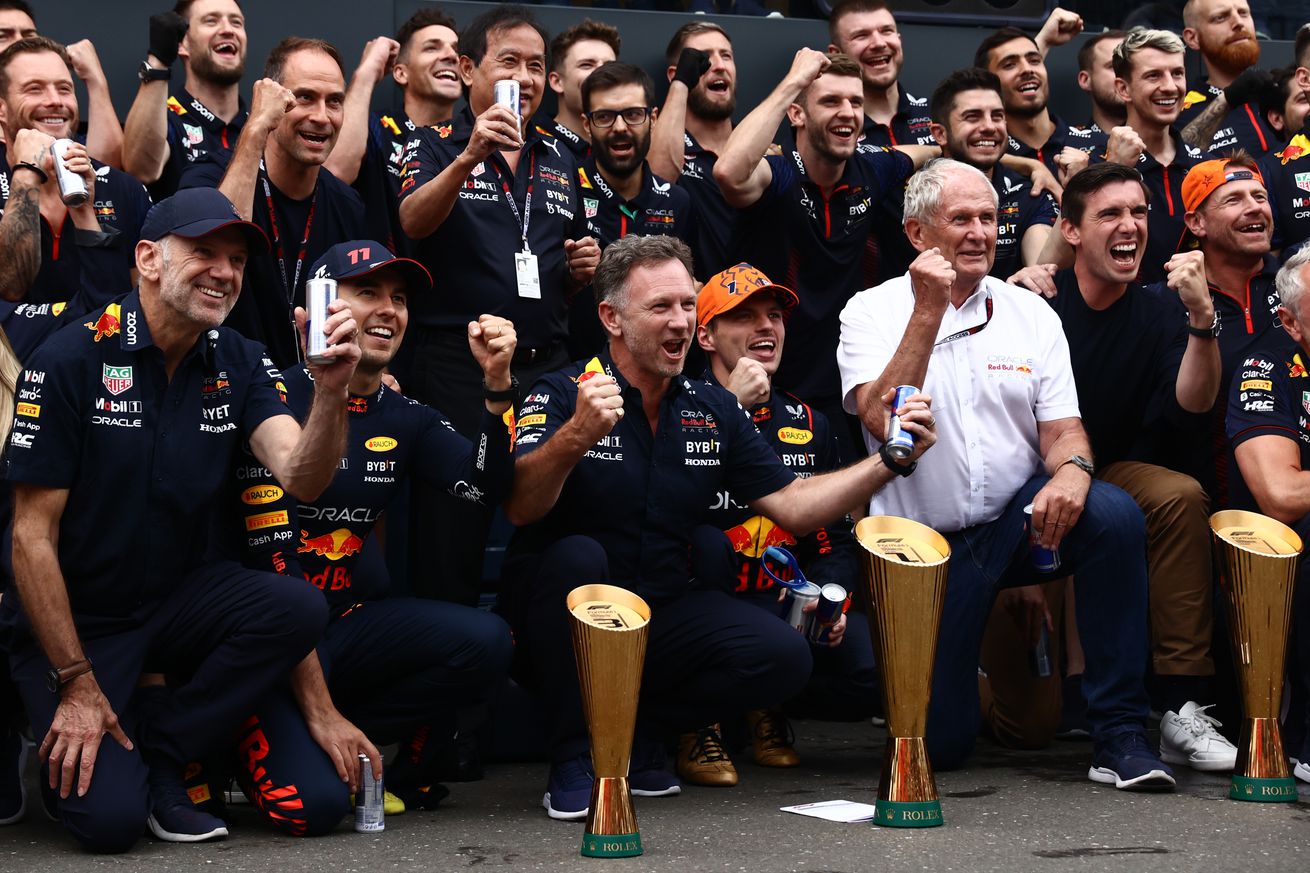
Photo by Jakub Porzycki/NurPhoto via Getty Images
It took some time, but we thought of some questions facing Red Bull right now
Things are never dull in Formula 1.
This was supposed to be a quiet week off, following a back-to-back in Austria and Britain, and ahead of another back-to-back in Hungary and the Netherlands. But a thunderbolt from the clouds came down on Monday, with the shocking news that Daniel Ricciardo was coming back to the grid.
After just ten races, AlphaTauri and Red Bull had seen enough from Nyck de Vries. The rookie was out, and Ricciardo was in, on loan to AlphaTauri starting with the Hungarian Grand Prix.
Still, with F1 on a bye week following the British Grand Prix it is time to take stock of just where each of the ten teams are ahead of Budapest. Working through the field from the bottom of the Constructors’ standings to the top, what is the biggest question facing each team right now?
We have reached pole position on our virtual walk through the grid, having taken a look at the other nine teams. But as we reach Red Bull, are there really any questions facing them?
Well, we managed to find not one, but really two.
Will they lose, and if not, what does that mean for F1 itself?
Photo by Anthony Stanley ATPImages/Getty Images
This is perhaps a two-part question, looking at a micro-level question, and then a macro-level question.
First, will Red Bull lose this season? Second, if they do not, what does that mean for F1 itself?
Let’s deal with the micro-level issue. Will the Bulls ever lose? Right now, it does not feel that way. The RB19 is the dominant car, and Max Verstappen is the dominant driver. While teammate Sergio Pérez has struggled in recent weeks — most notably during qualifying — Red Bull has built a commanding lead in the Constructors’ Championship, and the duo sits 1-2 in the Drivers’ standings.
In fact, Verstappen’s 255 points alone would place him atop the Constructors’ table.
And with the team sitting on ten-straight wins (11-straight dating back to last season) they are on the brink of setting a new standard in F1, as a win in Hungary would break a mark of 11-straight wins set by both Red Bull these past two years, and McLaren back in 1988. As for Verstappen, his win at Silverstone was his sixth-straight victory, and Sebastian Vettel’s mark of nine-straight wins set back in 2013, is coming into focus.
So yes, at the moment it does not look like Red Bull is going to lose any time soon.
Sure, teams are chipping away. Mercedes, Ferrari, Aston Martin, and even McLaren in recent weeks have posed various threats. But are those true gains, or more track-specific results? For example, as we pointed out with McLaren, their struggles in low-speed corners were minimized at Silverstone, but could be a problem next week.
So if the incredible happens, and Red Bull sweeps the season, what does that mean for the future of F1?
Or more specifically, the cost cap?
Because at some point Red Bull will be able to shift their focus to 2024, and the RB20. With their commanding lead, upgrades to the current season might not be a priority, and they can get a jump on 2024 development under this year’s cost cap.
This is a concern raised in recent weeks by some of their competitors, most notably Lewis Hamilton at Mercedes. “From my personal experience, when you are so far ahead when you are 100 points ahead, you don’t really need to do a lot more development on your car so you can start earlier on your next car,” Hamilton said ahead of the Austrian GP. “With a budget cap, that means spending that year’s money on the next year’s car.”
Hamilton proposed a date, ensuring that no team gets a head start.
“But if everyone knew you could start whatever date it is… August 1 is when everyone (can start developing), something like that, no one has a head start, and it’s a real race in that short space of time for the future car,” added Hamilton. “I don’t know. Maybe that would help everyone be more on a closer level. I might be wrong, but something’s got to change.”
Still, it is unlikely such a rule goes into effect this year. And if one were to, it might already be too late. Horner said after the Canadian GP that “[a] lot of the focus back in the factory is already on next year:”
— @RBR_Daily (@RedBullUpdates) June 18, 2023
When FIA implemented the cost cap, there was a belief that it would take a few years for the effects to truly be felt. As Horner outlined, restrictions on wind tunnel time might not be felt immediately. As we have seen this year, at least in the middle of the field, things are tightening up. It does feel as if, for example, Mercedes might be up one week, McLaren another, Aston or Alpine or Ferrari the next.
But things have yet to tighten regarding Red Bull.
And if they sweep the season — and set themselves up for a strong 2024 by starting work on the RB20 now — what does that mean for F1 itself?
More on that in a bit.

Must See
-


American Football
/ 10 mins agoNBA’s 11 best rookies this season, ranked
Let’s rank the best rookies in the NBA for the 2023-2024 season This rookie...
By -


American Football
/ 5 hours agoMcLaren managing expectations ahead of F1 Chinese Grand Prix
As the grid heads to Shanghai, McLaren is keeping expectations realistic It has been...
By -


American Football
/ 7 hours agoAlpine bringing a major upgrade for Esteban Ocon at the F1 Chinese Grand Prix
Photo by Qian Jun/MB Media/Getty Images Looking to improve their challenger, Alpine is bringing...
By





